Play for Pay
by SealWyf, HSM team writer
The day I’d dreaded had arrived. In the middle of an intense session of “Claustrophobia”, a message flitted across the screen, half-hidden by the fireballs of exploding ships and the glowing clouds of nebulon.
I had just reached Novus Prime’s top rank, Level 30.
I should have been happy. After all, this was what I had been working for. I had reached the top of the heap — made Commander, won the corresponding uniform, and unlocked the final weapons system. I was officially a big dog among Home’s Novus Prime players. And, indeed, I was proud that I had done it. But there was a down-side to my achievement.
Having won everything on offer, what further reason did I have to play?
I’m a gamer — a casual one, but devoted to the medium and its possibilities for human expression. Over the years, I’ve become a connoiseur of fun. The games I have loved, the ones I remember with a fond nostalgia, were those that gave me an enjoyable, immersive experience. I didn’t play them to win bragging rights. And I certainly didn’t play them to win rewards.
When did this change? I wonder. Because the change is real. Time after time, I find a game in Home that I enjoy. I play it with an enthusiasm bordering on obsession until I’ve unlocked all it has to offer. And then I drop it. I was still having fun. But, without rewards to pursue, there was no more reason to play.
I stopped playing Saucer Pop, a game I was actually pretty good at, once I had all the chairs, tables and helmets. I have ignored Orb Runner and Island Defender ever since I reached Level 100 and won the coveted Aurora Champion Apartment. And I dropped Novus Prime cold when I hit Level 30. My only hope is that Hellfire Games will open up more levels. Without them, I may drop in for an occasional bot-zapping session, but it will no longer be one of my regular stops in Home.
So what are these rewards for which I am jonesing? With few exceptions, they are things I don’t want — clothes and furniture that get dumped into Storage and forgotten. I played the game to win them. But I didn’t want them in the first place. And, having won them all, I lost interest in the game.
I never used to need to be bribed to game. For years I played alone, or with a few real-world friends. But something changed in early 2009, when I attached my PS3 to the Internet. With connectivity, I could see other players. Very few of them were my real-world gamer friends. Most were just screen names attached to profiles — level numbers and lists of virtual trophies.
Some of those profiles were amazing. There were some real hard-core gamers out there. I was impressed, and a little jealous. And, suddenly, I started to care about my gaming status.
Trophies are the basic layer in the economy of status that has taken over console gaming. It was a brilliant move on Sony’s part. Rewarding the best players encouraged competition, which in turn encouraged more play, and more game purchases. The status economy expanded again with Home and its infinite stock of virtual items. Some were purchases, monetization pure and simple. Others were unlockables — free promo items or game rewards. All these items were tools for displaying status.
Rewards can now spill between Home and other games. The economy of status has become vast and intricate — a new, expanding meta-game. Step by step, the goal of gaming is being shifted from having a good time to building status based on trophies, unlockable content and Home-based virtual property. And this carefully-nurtured drive for status in turn feeds monetization.
Monetization is, of course, the real meta-game, the reason for all the content so cheerfully provided.
The old economic model was simple: you bought a game, and you played it until you got tired of it. Then you bought another. But the cost of game development was escalating, which drove up the cost. A good disk-based game was no longer an impulse purchase. Gamers were starting to wait for cheaper used copies.
It was time for a new economic strategy: the PlayStation Network, with its online sales of downloadable games and its status economy of ranks and trophies. And, also on the network, PlayStation Home, with its own status economy, and its infinity of impulse-purchase microtransactions.
The new economic strategy changes everything, for everybody. I’m in Home for social interaction. But I’m not immune to the seductions of status. And, consequently, I’ve become a reward addict. When a new game appears in Home, I ask three questions: “Is it fun?”, “What does it cost to play?” and “What stuff will it give me?”
Reasonable questions, all of them. My concern is that the first question, the one that used to be the most important, is now balanced and moderated by the other two. I will play a very boring game if I think its real-world cost is justified by the rewards — the game is simply an indirect way of purchasing them. If the rewards are lame, I’ll still play if the game is reasonably fun and the cost is moderate.
These would be reasonable compromises, if I could stick to them. But, too often, I’ll find myself playing a boring game with a high price tag, for a reward I will never use. I’m going for it simply because I haven’t won it yet. And I’m not the only one. All over Home, gamers are laboring for rewards they don’t want, simply to prove they can do it.
In other words, for status. Someone in the Sony marketing department is a bloody genius.
And so monetization — “pay to play”, in Home parlance — has merged with “play for pay”, as we grind through boring games to win worthless trinkets. Money gets spent, and trinkets get earned, only to be dropped down the black hole into Storage. But resentment builds up. More of us are noticing that we’re no longer having fun. Play can start to feel remarkably like addiction.
I’m trying to be a more discerning consumer. But, like all strong habits, breaking the cycle takes work. I have managed to steer clear of most of “Midway 2″, concentrating my play on the few rewards I really wanted. I find myself hoping that the prizes in the upcoming third Midway will be just as lame — it will make those tedious, expensive games easier to avoid.
Meanwhile, I keep reminding myself that most of the games in the Paradise Springs Casino are boring and lossy, and that the rewards aren’t anything I need. I try to concentrate on poker and blackjack. But there have been nights I found myself down several thousand on the slots, draining my hard-won poker profits, because the next reward is just a few thousand points away. And I loathe myself, and my lack of will-power. It feels, sometimes, almost like a real casino.
But whingeing gets old, and listening to someone else whingeing gets even older. I fully recognize that Sony needs to turn a profit. And I’m willing to help them do it. Lord knows the amount of real-world cash I’ve dropped on Home bears me out. I don’t expect my gaming to be free.
No, the point I’m trying to make is one I made in a previous article on the Home economy: that the job of Home’s designers is not just to make us spend real-world money. We’re going to do that anyway. Their job is to find some way to keep us from resenting it — to design the monetization and reward systems as carefully as they design the games, so the money spent seems like a reasonable exchange. To make five dollars for a game upgrade feel as fair as buying a burger and fries. To make paying for an experience in Home as much of a no-brainer as paying for a night at the movies, and as logical as buying a downloadable supplement for a disk-based game.
Is this possible? I think it is. And some of the best offerings on Home bear me out. I mentioned that I dropped Novus Prime when I hit Level 30. However, when I maxed out Sodium 2 at Level 40, I felt no compulsion to quit. It’s true that I’ve hit the end of the normal rewards. But every race still earns me Sodium Credits, an in-game currency I can spend on exclusive items.
They’re expensive, these items. They’re well-made and desirable. I still have only a fraction of the things on offer. At my play levels, it takes me forever to earn them. But I’m bound and determined that someday, somehow, I’ll be able to buy my own Golden VICKIE.
So, to the other developers out there: take a tip from Lockwood. Stop giving fixed rewards with a definite end-point. Make the rewards infinite, by letting us earn tokens to spend on things we really want.
Make it a real economy. Add new items to the token-store from time to time, so there will always be something to work for. Retire older items, to add the urgency of exclusivity. In other words, balance “pay to play” with a second layer — not a fixed ladder of rewards, but a genuine system of “play for pay”.
Hey, it works for real-world arcades. Have you ever been to Dave and Buster’s? Or your friendly neighborhood school carnival? Rewards there are not fixed — you play games to earn tickets you can spend as you wish. And you spend them with pride, on some really obnoxious junky items, just because you can, and it’s your choice. And you come back later, to play the games again and earn more tickets. Think about it.
The fun of gaming will keep us coming back. We’ll pay to play, and play to be paid. It may be irrational, but it works. The economy of status can work more like a real economy, if you add some market flexibility.
It works for me. I’m willing to bet it works for other Home users. At any rate, it’s worth a few experiments. I really want a reason to return to Novus Prime.


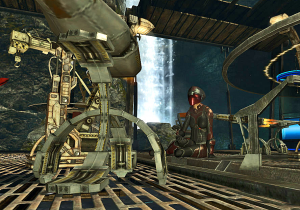
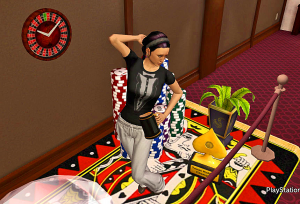
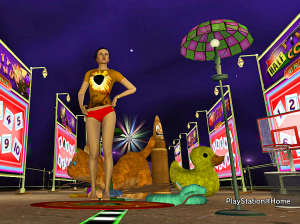
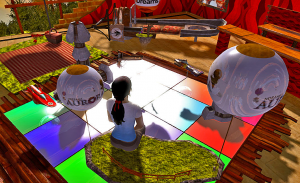
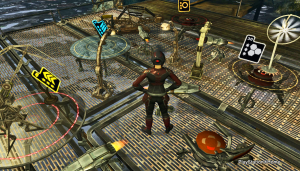
Yes thank you, exactly my sentiment. You should join my rewardaholics anonymous group. My compulsion has been responsible for impulsive purchases more than i care to admit. I agree wholeheartedly that Lockwood has done a lot of things right. I love sodium credits, I don’t have everything yet but their rewards are awesome, great designs and things you actually want, and not impossible or expensive to get, but keeps you coming back. Yes they are expensive in credits, i mean 50k for a tshirt, but I want them I don’t know if Ill wear them but i want them. I paid for the pilot jacket over a year ago and i am still enjoying the benefits of that because i earn resources i can trade for credits in it. I still play sodium 2 even after capping on the level ladder and earning all rewards, again because i earn credits and breaks the monotony of playing salt shooter. I bought the bartender outfit to earn credits when i don’t feel like playing sodium 1 or 2. Multiple games that give you credits towards the same rewards. That’s ingenious. I have purchased the green ticket Once, and was quickly over it. I think i still have a few plays left. I have yet to purchase chips because i’m not that big on casino games and the rewards aren’t really that appealing to me. Great read Seal! I must admit i am dreading that level 100 in aurora because i know i will give up playing it once i reach it.
I don’t know if Ill wear them but i want them. I paid for the pilot jacket over a year ago and i am still enjoying the benefits of that because i earn resources i can trade for credits in it. I still play sodium 2 even after capping on the level ladder and earning all rewards, again because i earn credits and breaks the monotony of playing salt shooter. I bought the bartender outfit to earn credits when i don’t feel like playing sodium 1 or 2. Multiple games that give you credits towards the same rewards. That’s ingenious. I have purchased the green ticket Once, and was quickly over it. I think i still have a few plays left. I have yet to purchase chips because i’m not that big on casino games and the rewards aren’t really that appealing to me. Great read Seal! I must admit i am dreading that level 100 in aurora because i know i will give up playing it once i reach it.
I’m actually looking forward to hitting level 100 in Aurora. I’ve spent over a year playing the game every single day and I’m ready for it to end. Not because I dislike the game, but because I’d like to use that time for newer Home passions, like Edo of Nippon. With new games being constantly added to Home, there has to be some kind of attrition.
I can’t really think of any game I’d want to play for perpetuity, so it’s nice when things come to a logical end. And getting a free personal space out of Aurora will give me a real sense of accomplishment. Besides, I still need to catch that Colossus in Sky Fishing.
Like the Sodium games, I continue to play Novus Prime to earn credits, even though I hit level 30 the same weekend the level cap was raised. I don’t play every day, mind you, but every now and again to kill time. I also collect my pilot’s salary daily since every update to Novus Prime usually includes a large number of new items and upgrades to purchase. This way, I can buy all the best stuff as it becomes available to me, without having to grind away to build up credits.
I completely agree with this article’s analysis. One of the biggest flaws to Cutthroats — I would say it’s a near-fatal flaw — is that the treasure chests don’t have coins in them. So there’s no means of acquiring (overpriced) power-ups except through hard cash, which means that most players will simply grind it to the top level and then drop it. Without power-ups, there’s really nothing to break up the monotony of taking turns with invincibility.
One of the most clever features I’ve seen for a Home game is Novus Prime’s salary. It gives dedicated players a reason to check back in every day, which helps keep up the residual traffic numbers. A very nifty way of hooking people to return.
In-world currencies work. If Home’s PR tagline is that it’s becoming more of a game itself, then it should have more gaming elements built into its infrastructure. I still believe the gold standard for this is Lockwood, with the Sodium Hub. *They* made Home into a game, with jobs, currency barter and interlinked spaces. I’d love to see SCEA follow that template with their own proprietary spaces. Imagine a currency — Sony credits, for lack of a better word — which could be earned through various activities, such as finishing specific quests on the Activity Board? And those credits could be redeemed for specific virtual items (probably the stuff that didn’t sell well during its initial release). What a great way to involve someone in Home and slowly coax money out of them!